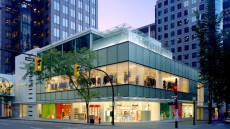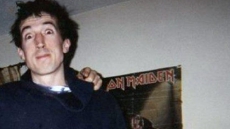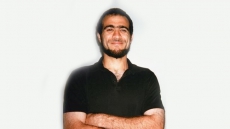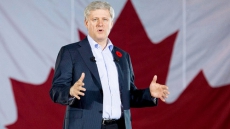OTTAWA — Peer pressure may be the best tool to convince young Canadians to vote in the upcoming federal election, say experts.
But political parties also need to give millennials a decent reason to head to the polls if they are to successfully reverse the downward spiral in youth voter turnout rates, they say.
"You have to motivate young people to vote these days, you have to give them a reason to vote," said David McGrane, a political science professor at the University of Saskatchewan, who points to studies showing the main reason younger people don't vote is that they simply don't care.
Fewer than 39 per cent of eligible voters aged 18 to 24 cast ballots during the 2011 election, according to Elections Canada.
Many of those who don't vote can't pinpoint a reason. "They just shrug and say 'I don't know'," said McGrane.
Part of the problem may come from a lack of trust.
An international study released Thursday by the left-leaning Broadbent Institute found that Canadians between the ages of 18 and 35 have little confidence in politicians.
The survey results also found that Canadian youth are even more unconvinced than their American counterparts that politicians care about their interests.
What helped U.S. President Barack Obama was a concerted effort to reach out to individual young people, and then shame them into voting, said Sam Gilman, founder of Common Sense Action, a bipartisan think tank established to educate and mobilize millennials to vote in the United States.
"Individual, personalized contact has an effect in turning folks out, and the peer effects are pretty strong," said Gilman.
Indeed, social pressure is seen as a key driver in convincing younger Canadians to do anything, said McGrane.
"Other people voting — that can entice young people to vote more," he said.
The Obama campaign had volunteers reach out individually to their friends to encourage them to vote, and in turn urged friends to convince friends to fill out ballots on election day.
"The level of sophistication they had for Obama in 2012 was mind boggling," said McGrane.
"You're talking about a sort of army of operatives using social media effectively."
An example of how person-to-person contact works well came during elections in the U.S. last November, said Gilman, when Facebook placed a banner over its website asking users to say whether they voted. Friends of those users could then see which of their friends voted.
"Research suggests that peer pressure gets more people to turn out to vote who either didn't remember to vote or didn't want to miss out on something their friends had done," said Gilman.
The federal Liberals, under leader Justin Trudeau, say they've learned a lot from looking south of the border.
"We spend a lot of time connecting and working with the Young Democrats," said Justin Kaiser, the 23-year-old national president of Young Liberals of Canada.
Part of that research helped to produce the party's commit-to-vote program — rolled out in September 2014, asking young Canadians to make the commitment to vote in the next election.
"Thousands" of mostly college and university students signed a pledge to vote as a result of the program, said Kaiser.
Studies from the Obama campaign show that if someone makes a commitment to vote, they are 10-15 per cent more likely to vote.
The parties are also using every imaginable online tool to reach out to millennials; Twitter, Facebook, Snapchat, Grinder.
But youth don't appear to be driven to vote by issues that affect only them, said NDP spokesman George Soule.
"Tuition fees work really well with seniors, and senior care works really well with people in their 30s and 40s," he said.
Young people "are worried about jobs, so (we are) putting job stats out there and talking about how government actually affects them directly and immediately."
If the Conservatives have a strategy for specifically attracting more young voters, they're not talking about it.
"We don't share our campaign strategy for obvious reasons," said party spokesman Kory Teneycke.
"I think all parties are united in the importance of first-time voters casting a ballot, regardless of which candidate they ultimately support."
Instead, Teneycke said the Tory plan is to target all age demographics leading to election day.
"Our campaign will be talking (about) our message of strong economic management to all Canadians, including young voters," said Teneycke.
"And we hope they will support the prime minister as he seeks re-election."





